

Schizophrenia: Key Facts. How does it feel to have this disorder?
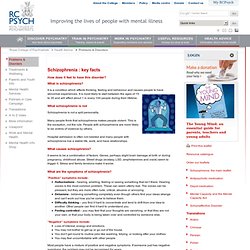
What is schizophrenia? It is a condition which affects thinking, feeling and behaviour and causes people to have abnormal experiences. It is most likely to start between the ages of 15 to 35 and will affect about 1 in every 100 people during their lifetime. Schizophrenia symptoms, possible early warning signs. The following list, compiled by one mental health consumer, contains some of the typical early warning signs of schizophrenia.

Keep in mind that schizophrenia onset is typically between the ages of 15 and 25 (although it can affect children younger than fourteen, with a subtype known as childhood-onset schizophrenia). The disorder can come on over a period of years (called insidious onset) or be very rapid. It affects 1% of the general population. 9780335238705. Mental health nursing. NHS Careers > Explore by career > Nursing > Careers in nursing > Mental health nursing Mental health nursing is often complex, demanding and very rewarding.
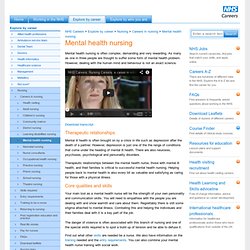
As many as one in three people are thought to suffer some form of mental health problem. However, dealing with the human mind and behaviour is not an exact science. Download transcript. Therapeutic relationships. Clinical Development: A framework for effective communication skills. This article outlines a framework for nurses to further develop their communication skills during interaction with patients.

It also shows how to implement this framework in nursing practice. Keywords: Communication, Patient education Authors Stephen J. Hamilton, MSc, PG Dip, BSc, RMN, is lecturer in health communication; David J. Clinical depression. Depression is more than simply feeling unhappy or fed up for a few days.
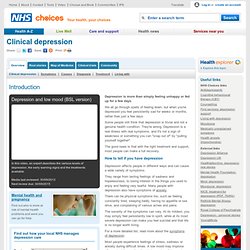
We all go through spells of feeling down, but when you're depressed you feel persistently sad for weeks or months, rather than just a few days. Clinical depression - Symptoms. The symptoms of depression can be complex and vary widely between people.
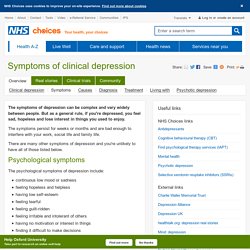
But as a general rule, if you're depressed, you feel sad, hopeless and lose interest in things you used to enjoy. The symptoms persist for weeks or months and are bad enough to interfere with your work, social life and family life. There are many other symptoms of depression and you're unlikely to have all of those listed below. Psychological symptoms. Clinical depression - Symptoms. Bipolar Disorder Signs & Symptoms: Mania & Bipolar Depression. What is bipolar disorder? Bipolar disorder (also known as manic depression) causes serious shifts in mood, energy, thinking, and behavior—from the highs of mania on one extreme, to the lows of depression on the other. More than just a fleeting good or bad mood, the cycles of bipolar disorder last for days, weeks, or months. And unlike ordinary mood swings, the mood changes of bipolar disorder are so intense that they interfere with your ability to function. During a manic episode, a person might impulsively quit a job, charge up huge amounts on credit cards, or feel rested after sleeping two hours.
Bipolar disorder - Symptoms. Bipolar disorder is characterised by extreme mood swings.
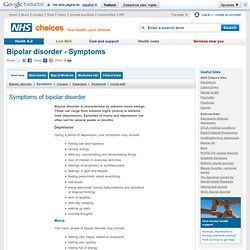
These can range from extreme highs (mania) to extreme lows (depression). Bipolar disorder - Treatment. Treatments aim to reduce the number and severity of the episodes of depression and mania that characterise bipolar disorder.
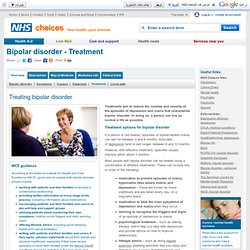
In doing so, a person can live as normal a life as possible. Treatment options for bipolar disorder. Bipolar UK. Bipolar disorder - Bipolar Support and Advice - YoungMinds. Agency Search Results for 'Schizophrenia' Schizophrenia. What is schizophrenia?

When a doctor describes schizophrenia as a psychotic disorder, they mean that, in their view, you can’t tell your own intense thoughts, ideas, perceptions and imaginings from reality. Views on schizophrenia have changed over the years. Questions have been asked about whether schizophrenia is one condition or more than one syndrome with related features.
These questions drive both debate and research. Although there may be some discussion over the true nature of schizophrenia, most psychiatrists will diagnose and treat in the same way. Many people argue that when considering a diagnosis of schizophrenia it is important to think about individual experience. Some people argue that because psychiatric experts can’t agree about the definitions, causes, and suitable treatments for schizophrenia, it shouldn’t be used as a diagnostic category at all. Schizophrenia. These pages cover what schizophrenia is, what the symptoms are and how you can get treatment.

Schizophrenia is a mental illness that affects the way you think.It affects about 1 in every 100 people.It usually starts during early adulthood.It does not mean that you have a split personality or that you are likely to be violent.The symptoms of schizophrenia can be split into ‘positive’ and ‘negative’ symptoms.Positive symptoms include experiencing things that are not real (hallucinations) and having unusual beliefs (delusions)Negative symptoms include lack of motivation and becoming withdrawn. These symptoms are generally more long-lasting.Many different factors seem to affect whether you develop schizophrenia.Medication known and therapy can help treat symptoms of schizophrenia. These pages are created by the Rethink Mental Illness Advice Service in accordance with the Information Standard. Last reviewed in February 2014. Next review February 2016. Find local support Useful Resources. Schizophrenia.
Mental health. Mental health (or behavioral health) is a level of psychological well-being, or an absence of a mental disorder.[1][2] From the perspective of 'positive psychology' or 'holism', mental health may include an individual's ability to enjoy life, and create a balance between life activities and efforts to achieve psychological resilience.[1] Mental health can also be defined as an expression of emotions, and as signifying a successful adaptation to a range of demands.
The World Health Organization (WHO) describes Health as “a state of complete physical, mental and social well-being and not merely the absence of disease or infirmity”. WHO further states that the well being of an individual is encompassed in the realization of their abilities, coping with normal stresses of life, productive work and contribution to their community. It was previously stated that there was no "official" definition of mental health. History[edit] Significance[edit] Perspectives[edit]
Aggressive Behaviour - Student Practice Education - Placement Orientation - VCH. What are the obvious signs of aggressive behaviour? - Yahoo UK & Ireland Answers. In psychology, as well as other social and behavioral sciences, aggression (also called combativeness) refers to behavior between members of the same species that is intended to cause pain or harm. Predatory or defensive behavior between members of different species is not normally considered "aggression. " Aggression takes a variety of forms among humans and can be physical, mental, or verbal. Aggression should not be confused with assertiveness, although the terms are often used interchangeably among laypeople, e.g. an aggressive salesperson.
There are two broad categories of aggression. Passive-aggressive behavior. Passive-aggressive behavior is the indirect expression of hostility, such as through procrastination, sarcasm, hostile jokes, stubbornness, resentment, sullenness, or deliberate or repeated failure to accomplish requested tasks for which one is (often explicitly) responsible. For research purposes, the DSM-IV describes passive-aggressive personality disorder as a "pervasive pattern of negativistic attitudes and passive resistance to demands for adequate performance in social and occupational situations". Concept in different areas[edit] In psychology[edit] In psychology, passive-aggressive behavior is characterized by a habitual pattern of passive resistance to expected work requirements, opposition, stubbornness, and negativistic attitudes in response to requirements for normal performance levels expected of others. Passive-aggressive may also refer to a person who refuses to acknowledge their own aggression (in the sense of "agency"), and who manages that denial by projecting it.
Defusing skills - Dfuse. Conflict escalation. Preventing_defusing_anger_hostility. Nursing Management of Aggression. Aggression arises from an innate drives or occurs as a defense mechanism and is manifested either by constructive or destructive acts directly towards self or others. Aggressive people ignore the rights of other people. They must fight for their own interests and they expect same from others. An aggressive approach to life may lead to physical or verbal violence. The aggressive behavior often covers a basic lack of self confidence. Aggressive people enhance to their self esteem by overpowering others and there by proving their superiority. Meaning Anger: Anger is defined as a strong uncomfortable emotional response to provocation that is unwanted and incongruent with one’s values, beliefs or rights.